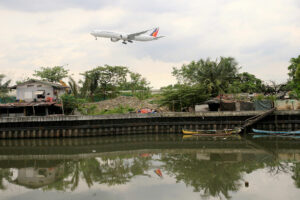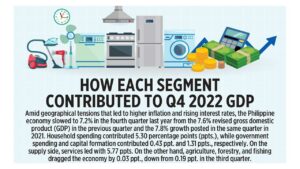Local airlines optimistic on travel demand despite spike in fuel surcharge

By Arjay L. Balinbin, Senior Reporter
LOCAL AIRLINES are optimistic that travel demand will be sustained in the next few months, even as airfares may rise due to the spike in jet fuel prices.
“While the remaining months of June to November are our traditional lean season, we remain confident that more passengers will fly in the coming months as travel restrictions have eased. We continue to see an uptrend in bookings as passengers show high interest in our seat sales,” Cebu Pacific Chief Commercial Officer Xander Lao said in a statement to BusinessWorld on Tuesday.
Philippines AirAsia, Inc. said the adjustment in the fuel surcharges will help cushion the impact of volatile global oil prices on airlines.
“AirAsia remains committed to offering best value for money deals for flights, SNAP (flight + hotel bundle) and other products housed on the AirAsia Super App to provide our guests with affordable options during their travels. We are optimistic that the adjustments in fuel surcharges will not affect the booking behavior of our guests who have been wanting to rediscover the Philippines and key destinations in ASEAN (Association of Southeast Asian Nations),” a company representative said in an e-mailed statement.
Starting this month, airlines are allowed to collect fuel surcharge under Level 7 or the highest level in a fuel surcharge matrix approved by the Civil Aeronautics Board (CAB).
Under Level 7, the fuel surcharge per passenger will range from P201 to P769 for domestic flights in June. This is higher than the P108 to P411 fuel surcharge for domestic flights in May.
For international flights originating from the Philippines, the fuel surcharge per passenger will range from P1,035 to P9,892 in June. This compares with the P543 to P5,026 rate in Philippine Airlines. The company has yet to respond to a request for comment as of press time.
Transportation expert Rene S. Santiago said the higher fuel surcharge will definitely affect passenger demand.
“Those who are in the margins (low to middle income) will opt out… Those in Class A won’t cancel or postpone their travel plans. Airlines will see how this would affect their load factors, and may adjust downwards if the load factors fall below breakeven,” he said in a phone message.
Regina Capital Development Corp. Equity Analyst Anna Corenne M. Agravio said airlines will likely face “tighter margins.”
“Airlines will have to balance passing on higher costs to its passengers against keeping rates competitive,” she said in a phone message.
Ms. Agravio noted that airlines may continue to see strong topline growth this year due to favorable base effects.
Rizal Commercial Banking Corp. Chief Economist Michael L. Ricafort said the higher fuel surcharge level would lead to “higher revenues amid the need to inevitably pass on higher fuel costs to passengers.”
“The increase in global oil/fuel prices is largely attributed to Russia’s invasion/war with Ukraine since Feb. 24, 2022 to among decade-highs, is considered an external/exogenous factor that is beyond the reasonable control of airlines, so passing on the added costs/burden to passengers is justified because failure to do so would lead to narrower margins, if not, undue losses,” he said in an e-mailed reply to questions.
However, airlines may be constrained to raise fares amid tight price competition in the industry.
“Furthermore, higher fares, at some point, would lead to some reduction/destruction in demand, thereby a delicate balancing act in order to ensure and sustain a healthy level of demand, while ensuring viability of operations amid the need to cope up with higher costs and narrower margins,” Mr. Ricafort said.
“This also highlights the importance of properly hedging fuel costs/requirements, as an option available to industry players, to better plan ahead and provide greater flexibility on costs/pricing vis-a-vis competition from both local and foreign industry players.”
Flag carrier Philippine Airlines and budget carrier Cebu Pacific have both reported higher revenues for the first three months of the year, with the former returning to profitability.




